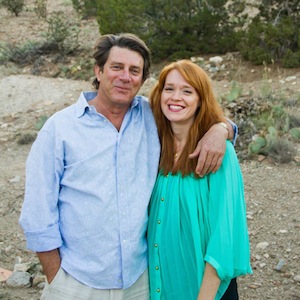Some folks might still care about doing things in the “right” order: getting married, moving in together, then getting pregnant. Emily Rapp is not one of them.
The traditional family is no longer recognizable. You might not know this from the slew of holiday commercials and the endless, vapid holiday songs blaring from hidden speakers in sidewalks, grocery stores, restaurants, EVERYWHERE it seems, but all of us know this to be a fact.
This year, I’ll spend the holidays with my fiancé Kent’s family. Since we got engaged, we’ve been joking that we’re doing “everything backwards.” We moved in together before we were engaged or married, and before long we learned we were pregnant with a little girl.
We joke that we’re too old (combined age: 100), to care about what people think, but I still have relatives and friends who are slightly scandalized (or perhaps just slightly perplexed), that even after my two previous marriages and the death of a beloved child, my current partner and I are not living our lives in the “traditional” way.
I’m not sure about you, but going the traditional route has never worked for me. My life has never been as tidy as social and cultural norms might like it to be. I’m happier than I’ve ever been in my life (and can only be because, I believe, I have felt more despair than I ever expected to feel within the span of these last two years), and I think the way Kent and I are going about living our lives is perfectly acceptable.
Growing up I knew very few divorced parents, no gay or lesbian couples, very few people who had a child “out of wedlock,” that hideous old phrase, who weren’t whispered about in public. My own grandmother does not know I’m pregnant because she would be horrified that Kent and I did it “the wrong way,” although she herself was young and unmarried when she had my father. For her it’s bad enough that we’re living together.
Divorce, I learned to believe as a kid, was a kind of terrible tragedy that struck those who hadn’t made good choices. I don’t regret either one of my weddings, they were not necessarily “bad” choices (although no, I could not see into the future), and in both cases, after the relationships were no longer healthy or possible to sustain, I don’t regret getting divorced. I learned a great deal from all of these experiences.
Although I don’t want to be in the position of offering “wisdom” to my daughter, I do hope that she will not feel ashamed when her life takes her in unexpected directions, which it no doubt will. I, in turn, hope to be proud of her, no matter what nontraditional arrangement of life or living she chooses to pursue. Having already lost a child, my main hope is that she outlives me. That’s it.
Here’s the deal: People want to be happy. This is not the trite “pursuit of happiness” line that we so often hear, but rather a human insistence to seek out the best life has to offer during what we know is limited time (and we do know that our time here is finite, even if we engage in the complicated acrobatics of denial). I’ve made so many changes in the last year: officially leaving a marriage that had ended long before the court stamped a document, falling in love, watching a child die after a prolonged and terrible illness, getting pregnant, and then getting engaged. People have said to me, “You’re a triumph.” I’m not a triumph. As a person, I am neither tragic nor heroic. Nobody is. I’m a human being, and I want to feel joy. I seek it out. So does everyone. So do you.
The “right” life I’ve found with Kent (and it is the rightest right I have yet to know or experience) is never going to align with what goes on in a holiday commercial. I’m happy to say that I have many friends who are creating their own family structures that occasionally appear in independent movies, but for now, are still considered outside the mainstream definitions of “family,” or at least the expression of family commonly depicted in the holiday shuffle of commercials and music. These include same-sex couple friends who will celebrate their first holiday with long-awaited-for children; women who are newly and happily single, even if extraction from a relationship is painful and complicated; men who are re-evaluating their attitudes toward parenthood, and how they’d like the relationships with their children to be different in the coming year.
I’m happy to be alive, living my nontraditional and complicated life. I have not always been able to say this. Here’s to that being the best tradition of all, and one that truly is available to everyone.
Photo, courtesy of the author, by Danielle Conyers
Role/Reboot regular contributor, Emily Rapp, is a professor in the University of Cailfornia-Riverside Palm Desert MFA program and the author, most recently, of The Still Point of the Turning World.
Related Links:

